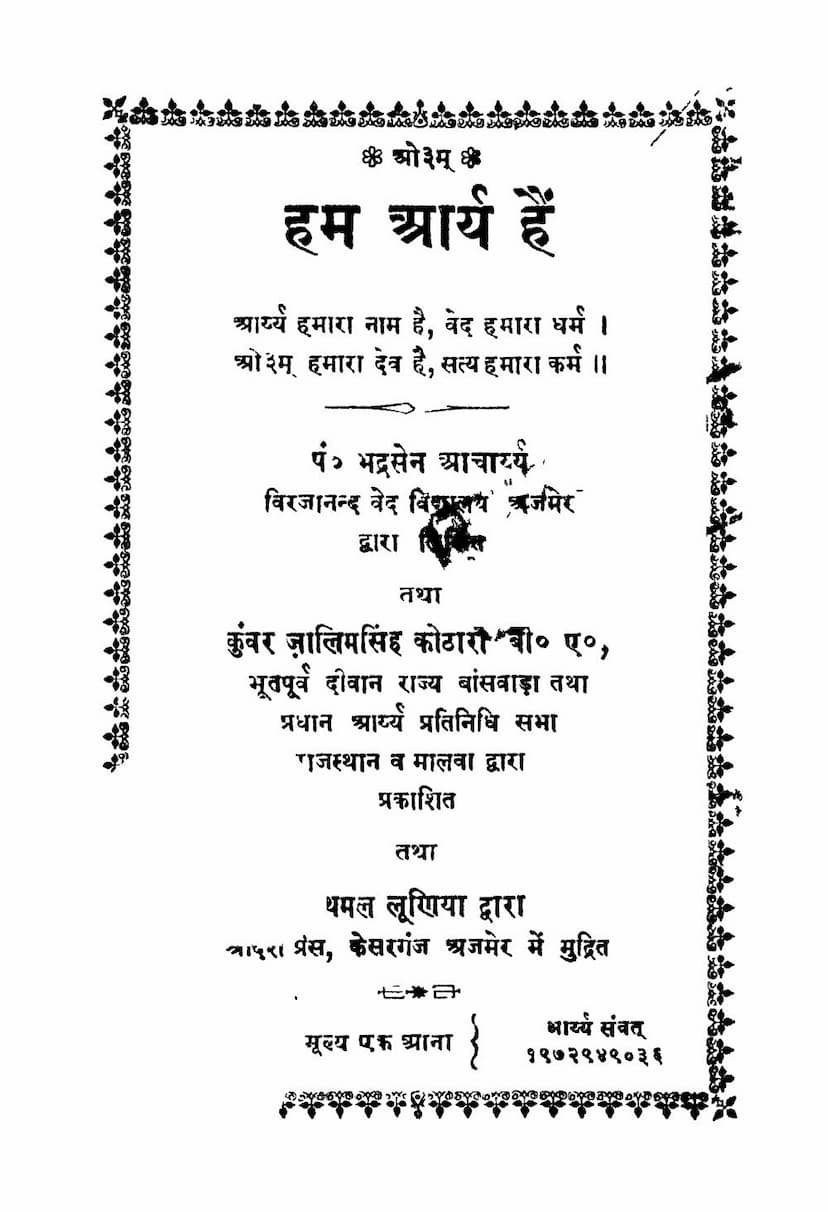Hum Aarya Hain
Added to library: September 1, 2025

Summary
Here is a comprehensive summary of the Jain text "Hum Arya Hain" by Bhadrasen Acharya, based on the provided pages:
Book Title: Hum Arya Hain (We are Aryans) Author: Pandit Bhadrasen Acharya Publisher: Kunwar Zalimsingh Kothari Core Argument: The book strongly advocates for the abandonment of the name "Hindu" and the adoption of the name "Aryan" for the people of India and their religion. It argues that "Hindu" is an imposed, derogatory, and inauthentic name with negative connotations, while "Aryan" is the true, ancient, and noble name that reflects the people's heritage and spiritual values.
Key Points and Arguments:
- The Origin of Names: The text begins by discussing how countries and peoples get their names, either from the dominant tribes or from geographical features. It posits that the ancient origins of humanity are in Tibet or the Pamir region, and from there, people spread across the globe.
- The True Identity of the People: It asserts that the first humans, enlightened by Vedic knowledge, were called "Aryas" (meaning noble, superior, enlightened). Those who deviated from this knowledge were called "Dasyus" (meaning demons or enemies). The land where Aryans settled became "Aryavarta."
- The Name "Bharatvarsha": The land of Aryavarta was later named "Bharatvarsha" after a powerful emperor named Bharat. The indigenous people who were integrated into this land, including those from south of the Vindhyas (Dravidians), were all Aryans. Therefore, "Aryan" is the true name for the inhabitants of this land.
- The Imposition of "Hindu":
- Greek Influence: When the Greeks invaded India around 325 BCE, they transliterated the name of the Sindhu river as "Indus" and the country as "India."
- Turkish Influence: Later, the Turks, who pronounced the 'S' sound as 'H', called the Sindhu region "Hindu" and its inhabitants "Hindus."
- Muslim Conquest: When Muslims established their rule, they found that the Arabic word "Hindu" meant "slave" or "infidel." Since they had conquered the land, they found this derogatory term suitable for the people and thus cemented the name "Hindustan" for the country and "Hindu" for its people.
- The Negative Connotations of "Hindu": The book vehemently argues that the word "Hindu" is derived from words meaning "slave" or "infidel" in other languages. Aryans, as noble beings, cannot accept such a demeaning name. The author believes that as long as the name "Hindu" persists, the people will remain enslaved and inferior, as names have a powerful influence on thoughts and actions.
- The Call to Action: The author urges the Indian government to stop using the terms "Hindustan" and "Hindu." Citizens are implored to reject the name "Hindu" and embrace "Aryan" for themselves and their country. Even those of Muslim and Christian faiths living in India are encouraged to call themselves "Bharati" or "Arya" rather than "Hindu."
- The Legacy of Swami Dayanand Saraswati: The book pays great tribute to Swami Dayanand Saraswati for revealing the true identity of the Indian people as "Aryans." It laments that despite his efforts to restore the Vedic path and the "Aryan" name, many of his followers have strayed, reverting to the "Hindu" identity.
- The Loss of "Aryan Identity": The author expresses deep sorrow that people have forgotten their "Aryan" heritage and are willingly adopting the "Hindu" name. He contrasts the past glory of the "Aryans," who were brave, determined, and united, with the present state of fear, weakness, and disunity that has arisen from embracing the "Hindu" identity.
- The Importance of "Aryan" for Unity and Progress: The book argues that true national unity and progress can only be achieved through the "Aryan" identity. The "Aryan" name is seen as unifying, life-giving, and inspiring, whereas the "Hindu" name is divisive and debilitating.
- Evidence from Sanatan Dharma Scholars and Others: The text cites evidence that even scholars within the Sanatan Dharma tradition recognize the people as "Aryans," not "Hindus." Examples include Sanskrit inscriptions and dictionaries where "Aryan" is used and revered, while "Hindu" is absent or carries negative connotations. The author also points out that Jains and Buddhists identify as "Aryans." Even Hitler, a Christian, proudly identified his race and civilization as "Aryan." A Muslim interlocutor also acknowledged the "Aryan" characteristics described by Swami Dayanand.
- The Book's Conclusion: The book concludes with a fervent plea to its readers to shed the "Hindu" name and its associated "Hinduness" entirely. It urges them to embrace the "Aryan" name, which signifies life, purity, enthusiasm, and valor, and to work towards making the Vedic religion (Arya Dharma) universal. The author believes that only through the "Aryan" identity can India regain its strength and spiritual glory.
In essence, "Hum Arya Hain" is a passionate manifesto advocating for a return to what the author considers the authentic, noble identity of India's people and their heritage, embodied by the term "Aryan," and a complete rejection of the imposed and demeaning "Hindu" label.